|
|
|
Sort Order |
|
|
|
Items / Page
|
|
|
|
|
|
|
| Srl | Item |
| 1 |
ID:
077179


|
|
|
|
|
| Publication |
2007.
|
| Summary/Abstract |
This article focuses on the role of international aid donors in Afghanistan since the signing of the Bonn Agreement in 2001. Specifically, it explores the scope and utility of peace conditionalities as an instrument for peace consolidation in the context of a fragile war-to-peace transition. Geo-strategic and institutional concerns have generally led to an unconditional approach to assistance by international actors. It is argued that large inflows of unconditional aid risk re-creating the structural conditions that led to the outbreak of conflict. Aid conditionalities need to be re-conceptualized as aid-for-peace bargains rather than as bribes for security. Some forms of conditionality are necessary in order to rebuild the social contract in Afghanistan. This finding has wider relevance for aid donors and they should reconsider orthodox development models in 'fragile state' settings. Rather than seeing conditionalities and ownership as two ends of a policy spectrum, the former may be a necessary instrument for achieving the latter
|
|
|
|
|
|
|
|
|
|
|
|
|
|
|
|
| 2 |
ID:
089514
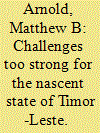

|
|
|
|
|
| Publication |
2009.
|
| Summary/Abstract |
Timor-Leste was badly shaken by a violent national crisis from April 2006 to April 2008. Central to the turmoil were the presence and actions of two groups of ex-soldiers from the Timorese army, known as "petitioners" and "mutineers." This article examines their roles in driving the crisis, by empirically mapping their history, motivations, and relationships
|
|
|
|
|
|
|
|
|
|
|
|
|
|
|
|
| 3 |
ID:
133431
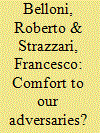

|
|
|
|
|
| Publication |
2014.
|
| Summary/Abstract |
Since the late 1990s international state builders have paid increasing attention to fighting corruption in both Bosnia-Herzegovina and Kosovo. On the surface this effort has brought significant results, since both countries have adopted legal frameworks modelled on the best practices of Western democracies. In practice, however, corruption remains rampant. This disappointing outcome has several explanations: in reviewing the empirical evidence we consider the two countries as cases involving heavily assisted transition from both socialism and war, highlighting how collusive practices between political and criminal interests have played a role in establishing formally liberal but substantively 'hybrid' institutions. We argue that the spread of corruption has been implicitly legitimised by international actors, who have pressured local parties to accept the formal architecture of good governance, including anti-corruption legislation, while turning a blind eye to those extra-legal structures and practices perceived as functional to political stability.
|
|
|
|
|
|
|
|
|
|
|
|
|
|
|
|
| 4 |
ID:
180199
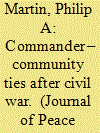

|
|
|
|
|
| Summary/Abstract |
Ex-rebel military commanders play a central role in peacebuilding after civil war. Yet the influence and mobilization power of these actors is not uniform: in some areas commanders retain strong ties to civilian populations after war’s end, while in other areas such ties wither away. This article analyses a novel dataset of former rebel-occupied localities in Côte d’Ivoire to investigate why commander–community linkages endure or decline after post-conflict transitions. The findings support a theory of political accountability: commanders retained political capital and access to networks of supporters in areas where insurgents provided essential goods to civilians during war. By contrast, where insurgents’ wartime rule involved abuse and coercion, commanders were less likely to sustain strong ties. These findings challenge the conventional wisdom that violent warlordism explains the persistence of rebel commanders’ power in peacetime. Rather, effective wartime governance may create regionally embedded strongmen who can in turn disrupt postwar state-building.
|
|
|
|
|
|
|
|
|
|
|
|
|
|
|
|
| 5 |
ID:
134294
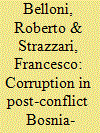

|
|
|
|
|
| Summary/Abstract |
Since the late 1990s international state builders have paid increasing attention to fighting corruption in both Bosnia-Herzegovina and Kosovo. On the surface this effort has brought significant results, since both countries have adopted legal frameworks modelled on the best practices of Western democracies. In practice, however, corruption remains rampant. This disappointing outcome has several explanations: in reviewing the empirical evidence we consider the two countries as cases involving heavily assisted transition from both socialism and war, highlighting how collusive practices between political and criminal interests have played a role in establishing formally liberal but substantively ‘hybrid’ institutions. We argue that the spread of corruption has been implicitly legitimised by international actors, who have pressured local parties to accept the formal architecture of good governance, including anti-corruption legislation, while turning a blind eye to those extra-legal structures and practices perceived as functional to political stability.
|
|
|
|
|
|
|
|
|
|
|
|
|
|
|
|
| 6 |
ID:
173907
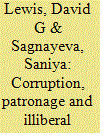

|
|
|
|
|
| Summary/Abstract |
This article engages critically with recent literature on political settlements through a case study of inter-ethnic conflict in southern Kyrgyzstan. The case study traces how a new political settlement emerged in the aftermath of conflict, despite a rejection of international proposals on conflict resolution. Instead, local elites constructed an exclusionary form of social order, forged through dispossession and violence, maintained by informal institutions of patronage and clientage. The article explains why this new political settlement appeared remarkably resilient, despite its failure to address traditional liberal concerns regarding transitional justice and minority grievances. The case study highlights two major problems with the political settlements literature. First, it contests a widespread conceptualisation of political settlements as indicating a cessation of conflict, instead pointing to how a political settlement can be initiated and maintained through different forms of violence. Second, it questions notions of inclusivity in political settlements, noting that many political settlements combine logics of both inclusion and exclusion. In many cases, they are marked by exclusionary, authoritarian practices that together constitute a form of ‘illiberal peace’. These findings caution against a simplistic use of political settlements theory to inform policies aimed at resolving internal conflicts.
|
|
|
|
|
|
|
|
|
|
|
|
|
|
|
|
| 7 |
ID:
078685
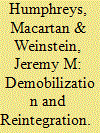

|
|
|
|
|
| Publication |
2007.
|
| Summary/Abstract |
Since 1989, international efforts to end protracted conflicts have included sustained investments in the disarmament, demobilization, and reintegration (DDR) of combatants. Yet while policy analysts have debated the factors that contribute to successful DDR programs and scholars have reasoned about the macro conditions that facilitate successful peace building, little is known about the factors that account for successful reintegration at the micro level. Using a new dataset of ex-combatants in Sierra Leone, this article analyzes the individual-level determinants of demobilization and reintegration. Past participation in an abusive military faction is the strongest predictor of difficulty in achieving social reintegration. On economic and political reintegration, we find that wealthier and more educated combatants face greater difficulties. Ideologues, men, and younger fighters are the most likely to retain strong ties to their factions. Most important, we find little evidence at the micro level that internationally funded programs facilitate demobilization and reintegration
|
|
|
|
|
|
|
|
|
|
|
|
|
|
|
|
| 8 |
ID:
073202
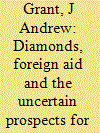

|
|
|
| 9 |
ID:
159236
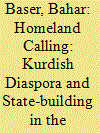

|
|
|
|
|
| Summary/Abstract |
The Kurdistan Region of Iraq (KRI) has regional autonomy within Iraq and it has been undergoing institution- and state-building for the last decade. The Kurdish diaspora has played a major role in this process by providing vital assistance to reconstruction and development efforts. This article examines the interactions between the Kurdistan Regional Government (KRG) and its diaspora by focusing on the diaspora engagement initiatives formulated by the KRG. The arguments are based on extensive fieldwork (2012–2016) that the author conducted in the KRI and Europe, including interviews with diaspora members, returnees and policy-makers.
|
|
|
|
|
|
|
|
|
|
|
|
|
|
|
|
| 10 |
ID:
170255
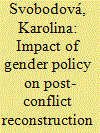

|
|
|
|
|
| Summary/Abstract |
The article analyses the relation between security and enhanced women’s participation in political, legal, and social matters in Rwanda after the genocide. Rwanda serves as a unique example of the fast empowerment of women in a developing state and hence as a model sui generis for investigating connections between greater female participation in post-conflict reconstruction and an improving security situation. The analysis consists of three research questions which examine the results achieved by women in legislation, civil society, and the judiciary, and their impact on the improvement of security in Rwanda.
|
|
|
|
|
|
|
|
|
|
|
|
|
|
|
|
| 11 |
ID:
157940
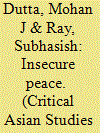

|
|
|
|
|
| Summary/Abstract |
This paper examines emerging citizen and local government relations in a village in the Junglemahal region of the state of West Bengal, once a major bastion of the Maoist insurgency in India. Since 2014, Junglemahal has not experienced a single Maoist-related incident. This has been widely attributed to the West Bengal government’s “model” handling of the insurgency, which rests on the rapid mobilization of public services through the non-elected arms of local governments, bypassing elected officials. How have Junglemahal’s residents experienced this particular form of post-conflict governance? Drawing on the culture-centered approach that ethnographically observes the processes of identifying development problems and developing community-grounded solutions to these problems, our findings indicate that the hyper-developmental state was paradoxically experienced by our respondents as a very distant entity. A recurrent theme in our interviews is the absence of a locally embedded party leadership that could be approached regarding issues of distributive justice. We argue that this desire for party mediation in public service delivery is an expression of a powerful social norm that has survived the conflict and ought to be integrated into post-conflict governance structures if the current peace is to endure.
|
|
|
|
|
|
|
|
|
|
|
|
|
|
|
|
| 12 |
ID:
076738
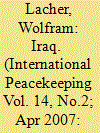

|
|
|
|
|
| Publication |
2007.
|
| Summary/Abstract |
In the literature on post-conflict reconstruction, the intervention in Iraq has been understood as an exception to, if not an aberration from, contemporary state-building. This article argues that whether Iraq is an exception to, or the epitome of post-conflict reconstruction depends on the genealogy one attributes to the latter. Denying that Iraq is an exemplary instance of contemporary reconstruction means neglecting the continuities of state-building from interwar trusteeship via Germany and Vietnam to the contemporary reproduction of the neoliberal model - continuities which the example of Iraq exposes more clearly than prior cases. An outline of the genealogy of state-building and an analysis of Iraqi reconstruction both point to the reproduction of a hegemonic international order as the rationale of statebuilding now and then.
|
|
|
|
|
|
|
|
|
|
|
|
|
|
|
|
| 13 |
ID:
152800
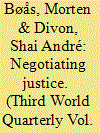

|
|
|
|
|
| Summary/Abstract |
The plural legal system in post-conflict Liberia expresses tensions between modern and customary institutions. This article seeks to understand how Liberians navigate choices in the plural legal system to address gender-based violence cases. By asking how and why people make the choices they do, we highlight how Liberians solve tensions between institutions, by creating flexible categories that allow them to pursue a course of action that does not compromise their ability to access social networks and resources
|
|
|
|
|
|
|
|
|
|
|
|
|
|
|
|
| 14 |
ID:
173900
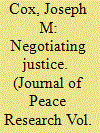

|
|
|
|
|
| Summary/Abstract |
Post-conflict justice is an integral component in maintaining stability and building peace in the aftermath of civil conflict. Despite its instrumental function, scholars routinely find that policymakers’ choice of justice is shaped by the structural conditions of the post-conflict environment, with outright victories leading to retributive forms of justice and negotiated outcomes yielding restorative forms of justice. However, existing literature conflates ceasefires and peace agreements into a single phenomenon, thereby overlooking the independent effects of each outcome. Leveraging the dual sovereignty framework, this article argues the conflation of negotiated outcomes is problematic because peace agreements and ceasefires generate different post-conflict environments. Relative to ceasefires, peace agreements lead to a reduction in the degree of dual sovereignty because they resolve a conflict’s incompatibility, thereby encouraging efforts to move society beyond war through restorative forms of justice. Due to the persistent threat of recurrent war generated by high levels of dual sovereignty, policymakers following ceasefires will be inclined to pursue retributive forms of justice that may target political opponents or potential defectors to bolster organizational strength. Statistical analyses confirm the underlying expectation that ceasefires and peace agreements yield different post-conflict justice outcomes. Peace agreements, relative to ceasefires, are more likely to be followed by the implementation of amnesties and reparations, whereas ceasefires exhibit a greater probability of yielding purges in the post-conflict environment.
|
|
|
|
|
|
|
|
|
|
|
|
|
|
|
|
| 15 |
ID:
175825
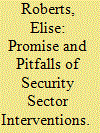

|
|
|
|
|
| Summary/Abstract |
Development practitioners and scholars have touted security sector reform (SSR) in Sierra Leone as a model for intervention. Twenty years after such reforms began, the West African country presents one with the opportunity to study the medium-term impact of SSR. This article argues that specialists should consider this SSR along five dimensions: security institution building, military reform and integration, internal security reform, professionalization, and disarmament, demobilization, and reintegration. This study further explores the impact these factors have had on security performance and legitimacy in the two decades since their implementation. Finally, this work concludes with an analysis of the current state of the security sector as well as a consideration of the lessons to be learned from the Sierra Leonean experience.
|
|
|
|
|
|
|
|
|
|
|
|
|
|
|
|
| 16 |
ID:
188568
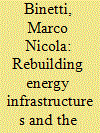

|
|
|
|
|
| Summary/Abstract |
Conflicts severely depress the manufacturing sector of affected countries and jeopardize its recovery once peace is re-established. Yet, I claim that donors' commitment to restore and develop infrastructures to generate, distribute, store and manage energy may boost an upswing of the manufacturing sector in post-conflict settings. This is because, first, as opposed to conventional developmental aid, post-conflict aid is proven to be unusually productive and unlikely to trigger the appreciation of the real exchange rate. Second, because restoring and enhancing energy infrastructures is expected to increase the return on investments in the manufacturing sector. To test my hypothesis, I resort to a cross-section time-series two-stage least squares multivariate analysis covering 45 post-conflict countries between 1970 and 2013. I find that donors' commitment to rebuild and enhance energy infrastructures in post-conflict countries has positive effects on the manufacturing sector of recipient countries both in the short and in the medium term. These findings contribute both to shed more light on the impact of foreign aid in fragile and post-conflict countries, and to the literature investigating the impact of electrification in developing economies.
|
|
|
|
|
|
|
|
|
|
|
|
|
|
|
|
| 17 |
ID:
144704
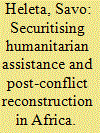

|
|
|
|
|
| Summary/Abstract |
The South African Defence Review 2014 is the country's new defence policy. The Review, which is expected to steer South African defence policymaking for the next few decades, discusses in detail the role of the South African National Defence Force (SANDF) in peace missions in Africa and proposes the direct involvement of the country's soldiers in both military and civilian tasks, from peacekeeping to humanitarian assistance, post-conflict reconstruction and development. This paper contains a critical review of the Review with regard to South Africa's envisaged contribution to regional and continental peace and stability. It is argued that humanitarian assistance and post-conflict reconstruction should not be securitised and that the SANDF should only be tasked with peacekeeping and the establishment of stability and security in fragile in-conflict and post-conflict settings. The humanitarian work should be left to humanitarian and aid agencies, while reconstruction and development should be left to organisations such as the New Partnership for Africa's Development, continental and international development organisations, and local actors.
|
|
|
|
|
|
|
|
|
|
|
|
|
|
|
|
| 18 |
ID:
169529
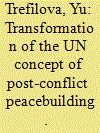

|
|
|
|
|
| Summary/Abstract |
THE UNITED NATIONS has time and again revised its concept of post-conflict peacebuilding and still has not come up with a definitive opinion.
|
|
|
|
|
|
|
|
|
|
|
|
|
|
|
|
| 19 |
ID:
188921
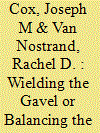

|
|
|
|
|
| Summary/Abstract |
This study analyzes the institutional variation across domestic legal systems, with a focus on common law system’s adherence to precedent and reduced recourse to judicial deference, as well as on the degree of independence afforded to courts. These institutional qualities of judiciaries provide the opportunity for courts to play a more active role in the implementation of post-conflict justice, increasing uncertainty for other policymakers concerning the ultimate contours of post-conflict justice processes. To reduce such uncertainty, policymakers ensconced in these types of institutional contexts will be less likely to implement post-conflict justice. Using data from the Post-Conflict Justice dataset, we find that states with common law systems are less likely to pursue and implement post-conflict justice compared to states with civil or Islamic law systems. Moreover, independent courts will be less likely to pursue mixed or restorative forms post-conflict justice, though the impact of judicial independence is weak overall.
|
|
|
|
|
|
|
|
|
|
|
|
|
|
|
|
|
|
|
|
|